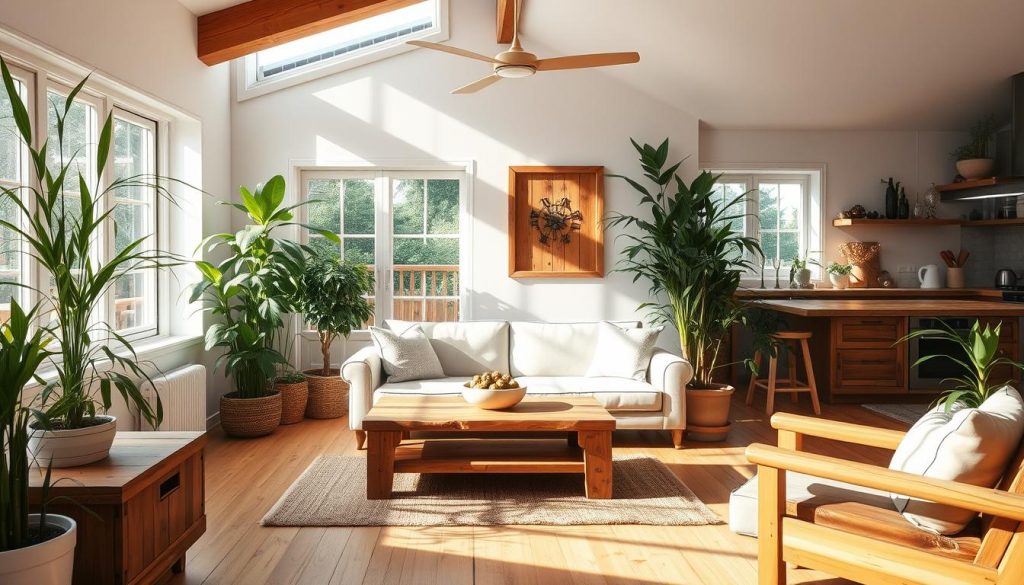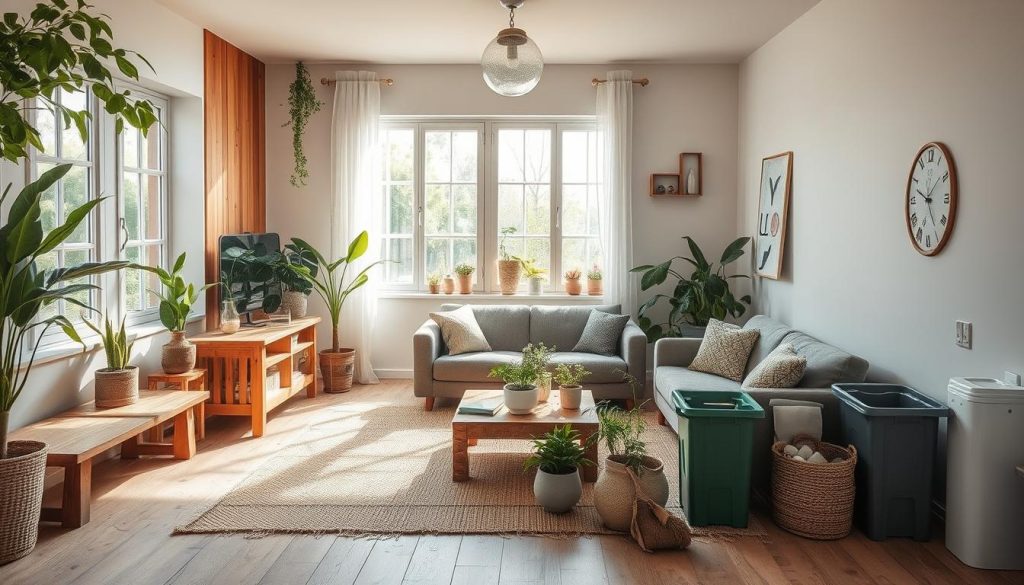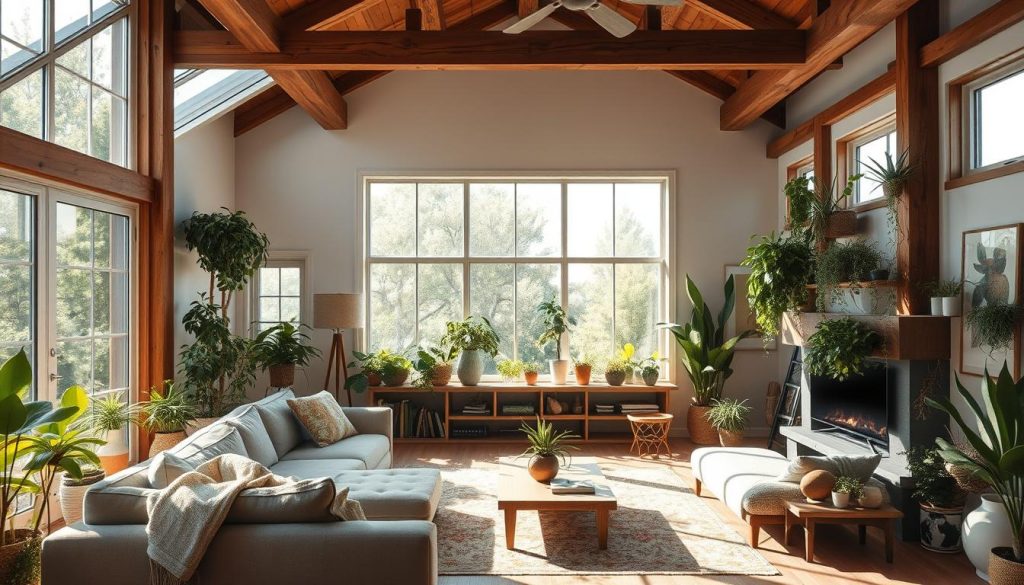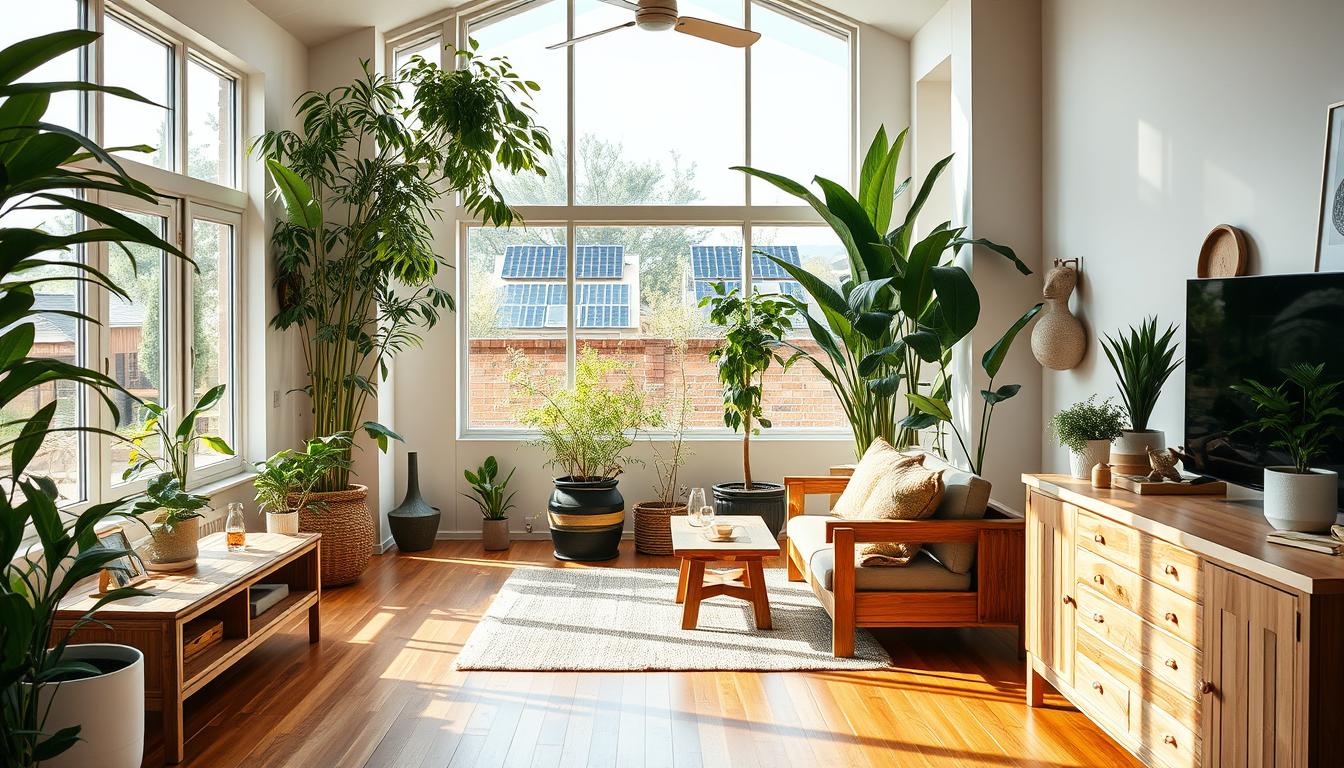As a homeowner, I’ve always wanted a sustainable living space. It should reflect my style and support eco-friendly practices. I’m excited to share my journey into zero waste home renovations.
In this article, we’ll look at the zero waste principles. We’ll see the benefits and share practical tips. These will help you make your home a sustainable haven.
Starting a home renovation is a big step. But, by following the zero waste philosophy, we can reduce our environmental impact. We can make our homes beautiful and responsible.
This article will guide you through the process. We’ll talk about choosing eco-friendly materials and reducing waste. You’ll learn how to make your renovation align with your values and help the planet.
Understanding Zero Waste Principles
Starting our eco-friendly home renovation journey means learning about zero waste. Zero waste is a way to use resources better and reduce waste. It helps lessen the harm our daily actions and home projects do to the environment.
What Does Zero Waste Mean?
Zero waste is about changing how we use and throw away things. It’s about making less waste, using what we already have, and recycling the rest. When renovating homes, it means choosing materials wisely, cutting down on waste, and finding new uses for leftovers.
Benefits of a Zero Waste Approach
- Less harm to the environment by avoiding landfills and incinerators
- Lower costs for renovations by reusing and recycling materials
- Helping save natural resources and energy
- Supporting a cycle where materials keep getting used
Common Misconceptions
Some think zero waste home renovations are too pricey or hard to find sustainable materials. But, with the right planning and research, it can be affordable and doable. It leads to saving money and reducing harm to the environment over time.
Planning for a Successful Renovation

Starting a sustainable home renovation needs careful planning for eco-friendly results. First, set clear, achievable sustainable goals. Think about the long-term effects of your choices and choose green solutions that fit your zero waste lifestyle.
Setting Sustainable Goals
When planning your sustainable remodeling, setting realistic goals is key. You might aim to cut waste by 75%, use 50% recycled materials, or reach a certain energy rating. Having these goals helps guide your decisions and keeps you focused on your eco-friendly dreams.
Budgeting for Eco-Friendly Materials
Eco-friendly materials might cost more upfront. But, they save money in the long run through energy savings and higher property value. When budgeting, look into prices for sustainable materials like reclaimed wood, low-VOC paints, and energy-efficient appliances. This ensures your green renovations fit your budget.
Collaborating with Green Professionals
- Find contractors, designers, and suppliers with a green track record.
- Check for certifications or memberships in green building groups. This shows their commitment to sustainability.
- Share your sustainable goals clearly and work closely with your team to meet them during the renovation.
Good planning is crucial for a successful, sustainable home renovation. By setting eco-friendly goals, budgeting for green materials, and working with experienced professionals, you can make your zero waste home a reality.
Choosing Sustainable Materials
Choosing the right materials for your home renovation is key. Opting for recycled, non-toxic, and energy-efficient options makes your home more sustainable. It also reflects your values.
Reclaimed and Recycled Options
Using reclaimed and recycled materials is a smart choice. You can find salvaged wood, repurposed metal, and upcycled furniture. These materials not only reduce waste but also add charm to your home.
Eco-Friendly Paints and Finishes
Look for paints and finishes that are non-toxic and low-VOC. These options are better for the environment and your health. Natural paints, water-based stains, and sealants are great choices for a sustainable home.
Energy-Efficient Appliances
Investing in energy-efficient appliances is wise. ENERGY STAR-certified models use less energy and water. Upgrades like smart thermostats and LED lighting make your home more sustainable and cost-effective.
Reducing Waste During Renovation

Minimizing waste is key in sustainable home renovations. During construction, many chances exist to cut down landfill waste. By using smart waste reduction methods, you can help the environment and save money too.
Strategies for Waste Minimization
Plan and order materials carefully to avoid buying too much. Measure exactly what you need to reduce waste. Also, work with your contractor to set up recycling systems on-site. This way, recyclables like metals and plastics won’t end up in landfills.
DIY Projects to Keep Materials Out of Landfills
Try DIY projects to reuse materials. Turn old doors or windows into furniture. Use reclaimed wood for shelves or walls. You can also make decorations from leftover tiles or bricks. These projects not only save materials but also add a personal touch to your home.
By using these strategies and DIY projects, you can greatly reduce waste during your renovation. This helps achieve a zero waste home makeovers goal. Every step towards waste reduction construction and low-impact home makeovers brings us closer to a sustainable future.
Incorporating Green Practices

Starting your zero waste home renovation is exciting. It’s important to use eco-friendly practices. These practices help reduce your environmental impact and make your home more efficient and sustainable. Let’s look at three key areas: using renewable energy, choosing water-efficient fixtures, and sustainable landscaping.
Using Renewable Energy Sources
Investing in renewable energy like solar panels or wind turbines is a smart move. It cuts down your use of non-renewable energy sources. This action reduces your carbon footprint and saves you money on energy costs.
It also gives you a reliable, clean energy source for your home. Adding energy-efficient retrofits can help you use even less energy and reduce your environmental impact.
Choosing Water-Efficient Fixtures
Water conservation is key in a zero waste lifestyle. Upgrading to water-efficient fixtures like low-flow showerheads and faucets is a good idea. These upgrades save water without losing performance.
They also lower your water bills and help save this valuable resource. It’s a win-win for your wallet and the planet.
Sustainable Landscaping Ideas
Your outdoor spaces are a great place to go green. Think about using drought-resistant plants, green roofs, or rain gardens. These ideas help save water and beautify your property.
They also support local ecosystems and reduce your environmental footprint. It’s a way to make your home look great while helping the planet.
By adopting these eco-friendly practices, you make your home more sustainable and efficient. You also help the planet. Remember, every small step counts. So, explore all the green home improvement options out there.
Maintaining Your Zero Waste Home
Living zero waste is a journey that never ends. Keeping your home eco-friendly needs effort and dedication. It’s about making waste-free habits a part of your daily life.
Establishing a Waste-Free Routine
Begin with simple steps like meal planning to cut down on food waste. Start composting and finding new uses for old things. Create a recycling system and always choose sustainable options over single-use plastics.
Educating Family on Zero Waste Practices
Teaching your family about zero waste is key. Talk to them about why it’s important and how it helps the planet. Encourage them to join in and make it a family effort.
Future Renovations: Keeping Zero Waste in Mind
When planning future home updates, remember to focus on zero waste. Use materials that are recycled or eco-friendly. Work with professionals who care about the environment. This way, your home will always be a symbol of care for our planet.

